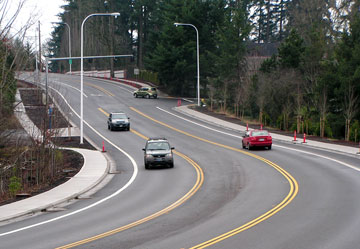 |
Previous Issues |
| Cedar Mill Community Website |
|
Search the Cedar Mill News: |
About The Cedar Mill News |
|
|||||||
| Volume 9, Issue 1 | January 2011 |
||||||
Powers That Be
|
 |
| The recently-completed Saltzman Road project was built using MSTIP funds |
The WCCC has specific authority for the projects funded by the Major Streets Transportation Improvement Program (MSTIP) and the County-wide Traffic Development Tax (TDT) program. Even though the TDT is assessed for specific development projects, it is placed in a fund which is used to address areas of highest county-wide needs caused by development.
By 2012 MSTIP will have built 111 projects that are heavily used by county residents and businesses, at a cost of $555 million. Major local projects include sections of Cornell Road, Saltzman Road, Murray Boulevard and the extension of Cedar Hills Blvd, as well as improvements to 170th, 185th and Brookwood avenues. Countywide, projects have improved Baseline, Cornelius Pass, Evergreen, Oleson, Roy Rogers, Scholls Ferry and Tualatin-Sherwood roads and the Verboort roundabouts.
Historically, transportation projects have had to meet certain criteria to be eligible for MSTIP funding. They must improve safety, remove bottlenecks, be major roadways used by many residents, rank as high local government priorities, and/or address multiple transportation demands (cars, trucks, bikes, pedestrians, transit). Importantly, these projects must be geographically balanced, providing benefit to residents all around the county.
Washington County Commissioner Roy Rogers currently serves as Washington County's representative on the WCCC and is also the Metro JPACT representative. JPACT and the Metro Policy Advisory Committee (MPAC) provide periodic review of their work and projects to the WCCC for consideration by the entire group. Considerable discussion can ensue among the regional partners but they usually reach consensus.
The WCCC is supported by the WCCC Transportation Advisory Committee (WCCC TAC), which is composed of senior staff representatives from local governments. Both committees have non-voting members from regional and state governments and area service providers. The membership of the WCCC TAC consists of staff representatives of all agencies on the policy body and reviews transportation plans (e.g. the Regional Transportation Plan), projects and funding issues (e.g. where to apply the Federal Fiscal Stimulus Program funds and where to allocate the Federal Regional Flexible Funds), and makes recommendations to the policy body (e.g. whether to recommend pursuing an increase in the state's Gas Tax). Notably the WCCC has direct input on the Fiscal Year 2012 Federal Appropriation requests which are being crafted for the county's federal legislative agenda. These will involve seeking money earmarked for specific projects, one of the traditional ways in which large-scale transportation projects are partially funded.
The public has indicated many times that we think growth should pay more of its own way. In 2008, the WCCC approved a proposal to double the transportation taxes paid by new development. In the process the existing Traffic Impact Fee (TIF) was more aptly named the Transportation Development Tax (TDT). The TDT was approved by voters and is being phased in through 2012, although the recession resulted in a temporary slowdown in phasing-in of the new TDT. The WCCC held extensive hearings on the principles and details of the revised TDT, including whether to allow more choices or more certainty to the developer, deciding to go with certainty.
The majority of county-funded road improvement projects are paid for in large part via MSTIP which is funded through our local property taxes. This innovative program gives county residents local control of improvements to their transportation network. It has been praised across the state as an example of smart and balanced response to growth.
In late 2010, the Portland City Club presented a report to the WCCC titled "Moving Forward: A Better Way To Govern Regional Transportation". In the report, the researchers concluded the WCCC is an appropriate model for a wider cooperative planning structure involving the entire Metro region (see Conclusion #6). Other Recommendations suggest federal and state money should be given to Metro to distribute on the basis of regional priority and that policies should be brought to focus on regional transportation planning/multimodality/cost efficiencies and greenhouse gas reductions; addressing jurisdictional cross-purposes, and how a mismatch between ownership and authority, and capability and available funds stymies projects; recognizes the political divide between Oregon and Washington in regional "transportation shed;" and suggesting that representation needs to be re-examined to provide weighted proportionality for all residents. All of these recommendations would directly involve consideration by the WCCC.
Note that local neighborhood streets are not included in the projects reviewed by the WCCC. The Urban Road Maintenance District (URMD) is a separate service district containing land only in urban unincorporated Washington County. It was created by the Board of County Commissioners, approved by voters in 1987 and finally funded by voters in 1994. The URMD maintains about 430 miles of neighborhood streets that are "below the radar" for other maintenance funds because there is no city to take care of them.
The WCCC meets monthly at the Beaverton City Library (see website for schedule) and is composed of elected representatives from Washington County and its cities: Beaverton, Hillsboro, Tigard, North Plains, Tualatin, Forest Grove, King City, Gaston, Cornelius, Durham, Banks, Sherwood and Wilsonville. Each jurisdiction with a voting membership has one vote. Washington County and cities' representatives to the Metro Joint Policy Advisory Committee (JPACT) and the Metro Policy Advisory Committee (MPAC) are also members of the WCCC. Members of the public are invited to attend and a time for visitor comments is provided at the beginning of the meeting.
History - Visual Timeframe:
www.co.washington.or.us/LUT/TransportationFunding/TransportationHistory/visual-timeline.cfm
History - Details:
www.co.washington.or.us/LUT/TransportationFunding/TransportationHistory/history-details.cfm
Published monthly by Pioneer Marketing & Design
Publisher/Editor:Virginia Bruce
503-803-1813
PO Box 91061
Portland, Oregon 97291